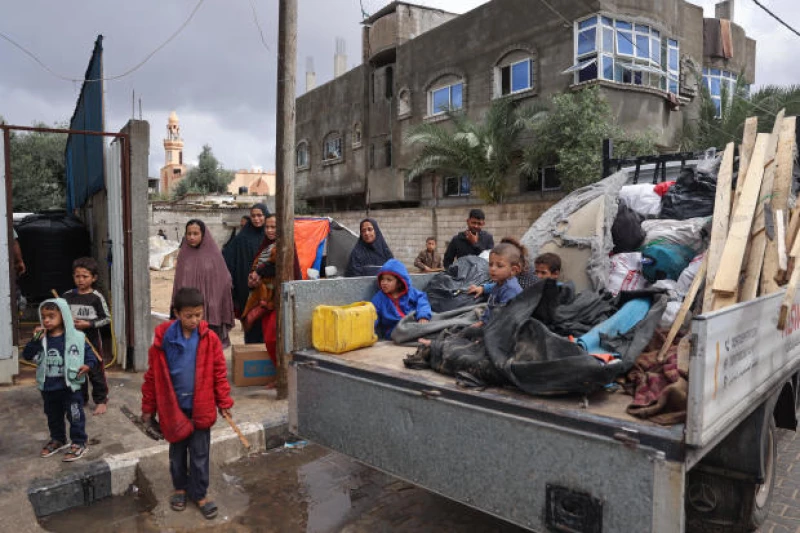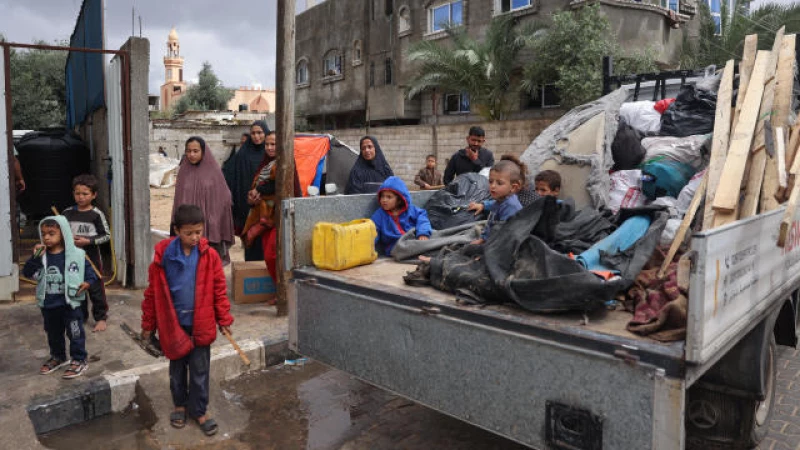Israel's military ordered Palestinians in the eastern part of the Gaza Strip city of Rafah to evacuate Monday ahead of a ground offensive long promised by the Jewish state's leaders. The message was delivered with fliers, phone calls, messages and media broadcasts in Arabic after a weekend that saw hope for a new cease-fire in the seven-month Israel-Hamas war dashed yet again.
People quickly started fleeing from the eastern part of Rafah on Monday, on foot or by any other means available to them.
Israeli Prime Minister Benjamin Netanyahu's government had stressed its intent to carry out an incursion into Rafah, Gaza's southernmost city, over the last week despite last-ditch efforts led by the U.S., Qatar and Egypt to broker a new cease-fire deal.

Those diplomatic efforts appeared to fizzle by Sunday however, with Israel and Hamas blaming each other for the impasse and Hamas then carrying out a deadly rocket attack on an Israeli military checkpoint near a key border crossing between Israel and Gaza.
President Biden has been urging Israel for weeks to restrict the scale of any Rafah operation and to refrain from launching a ground offensive on the city without ensuring the safety of over 1 million displaced Palestinian civilians who have sought refuge there from various parts of the Gaza Strip.
The Israel Defense Forces announced on Monday that they were planning to evacuate up to 100,000 individuals from the eastern area of Rafah. These individuals were instructed to move several miles to the northwest, towards the al-Mawasi region on Gaza's Mediterranean coast, where humanitarian aid has been arranged. The military mentioned that the preparations included essential supplies like food, water, medicines, and the setup of a field hospital.
Despite hopes last week that ongoing international diplomacy efforts could lead to a new agreement for the release of additional Israeli hostages held in Gaza in exchange for a ceasefire, thus avoiding a Rafah offensive, the IDF seemed to be gearing up for the operation following the Hamas attack on the Kerem Shalom border crossing.
Hamas fighters launched a rocket strike on Sunday from the eastern part of Rafah, hitting an IDF checkpoint located just around 1,000 feet away from the crossing. The attack resulted in the death of four IDF soldiers and left several others injured, as reported by the military on Monday, increasing the previously reported death toll by one.
The evacuation order issued on Monday was not confirmed to be directly linked to the Hamas attack on the Kerem Shalom crossing.
Hamas spokesperson Sami Abu Zuhuri, quoted by the Reuters news agency on Monday, stated that the evacuation order was a "dangerous escalation" on Israel's part and warned of potential consequences.
Zuhuri attributed the ongoing conflict to the U.S.'s support for Israel, following Hamas' terrorist attack on Israel on Oct. 7, resulting in casualties and hostages. Some of the captives, including U.S. nationals, are still believed to be held by Hamas or its allies in Gaza.
- Queen Rania of Jordan says U.S. is seen as "enabler" of Israel
According to an unnamed Hamas official reported by Axios, the group, labeled a terrorist organization by Israel and the U.S., threatened to withdraw from negotiations for a hostage release and cease-fire due to the evacuation order.
Israeli Defense Minister Yoav Gallant, speaking to IDF troops in Gaza on Sunday, expressed concerns about Hamas not adhering to a cease-fire plan. He warned of potential future military actions in Rafah and other areas in the Gaza Strip.
Amidst the already devastating situation in Gaza, the morning brought more fear and uncertainty for the hundreds of thousands of Palestinians seeking refuge in Rafah. Many of them have been displaced multiple times due to the conflict between Israel and Hamas in Gaza.
"They are calling people in the eastern area of Rafah, some also in the west, near the Rafah crossing, ordering them to leave," shared Palestinian Abu Muhey, who has been staying with family members north of Rafah. "We don't know what to do, but I will take my family to Deir Al-Balah," he said, indicating their plan to flee further north within the war-torn Palestinian territory.
Concerns have been raised by U.S. officials about the logistical challenges of evacuating such a large number of people from Rafah before a potential offensive. The United Nations has also issued warnings, stating that a full-scale military operation in the city could put hundreds of thousands of civilians at risk of death.
- Why Israel is so determined to launch a ground operation in Rafah
"An Israeli offensive in #Rafah would mean more civilian suffering & deaths. The consequences would be devastating for 1.4 million people," emphasized the U.N.'s humanitarian agency for Palestinians, UNRWA, in a social media post on Monday.
UNRWA Stands Firm in Providing Aid Despite Conflict
Amid escalating conflict in Rafah, the United Nations Relief and Works Agency (UNRWA) has made it clear that they will not be evacuating. In a recent tweet, the agency stated, "UNRWA is not evacuating. The Agency will maintain a presence in Rafah as long as possible & will continue providing lifesaving aid to people."







